Surrounded by rocky hillsides, herds of Black Wildebeest ran with impunity among the fields of South Africa’s Free State. It wasn’t always this way. In fact, it wasn’t long ago that seeing even a single Black Wildebeest on this land would have been unheard of. And unwelcome.
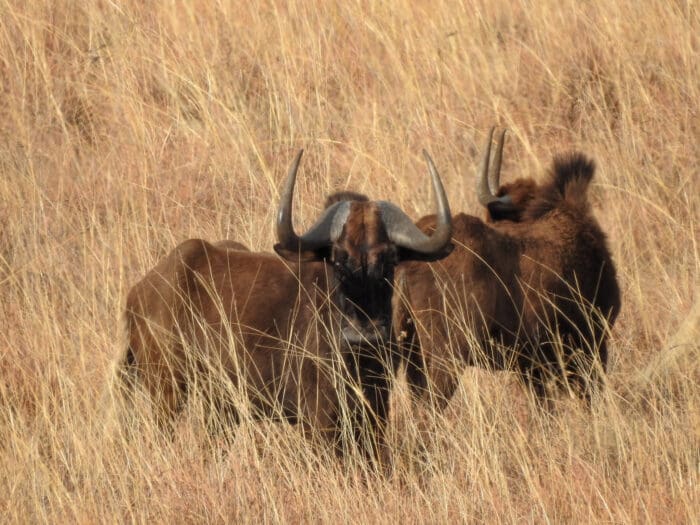
By the time of The Great War’s beginning, the dominant herbivore in South Africa was reduced to less than 600 animals. The Black Wildebeest wasn’t driven to near oblivion for its meat or its horns. Its hide wasn’t considered rare or particularly valuable. No, when the Boers fled British rule in the Cape Colony to homestead north of the Orange River, they did what Boers do. They farmed.
Our hungry herbivore was in direct competition with hungry humans, and like every species before it, the Black Wildebeest lost.
They were a particular problem for the farmers. This was no docile domesticated cow. Herds of horns and hooves meant ripe fields would be decimated overnight. Farmers fenced out and shot every one they could, and I can’t blame them.
Not very long ago, right here, in the very fields where I was standing, the Black Wildebeest was done for. But not anymore.
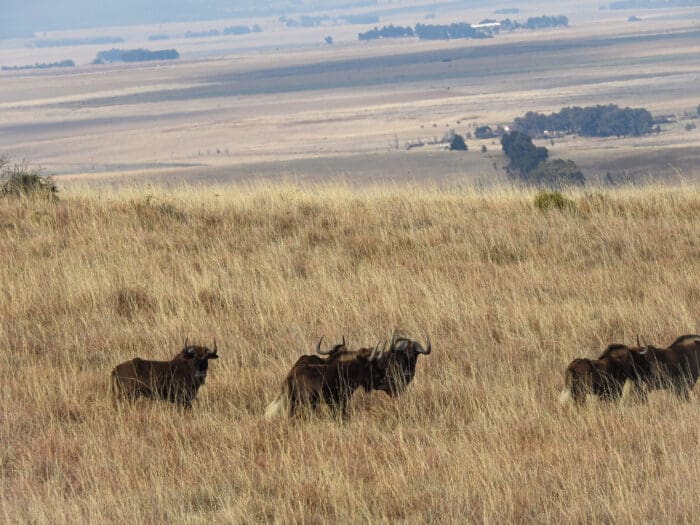
Now their numbers likely reach into the tens of thousands and the species sits comfortably in the “least concern” conservation status, right there along with dairy goats and bullfrogs.
The reason for the turn of fortune for the Black Wildebeest was standing next to me. Jaques Jordaan was my PH and the owner of Ndlotti Safari Adventures. These were his fields, and those were his Black Wildebeest. Jaques and men like him throughout South Africa have spent no small amount of time, sweat, and money raising those animals and keeping them safe.
All so I could kill one. But they weren’t making it easy on us.
As Jacques and I headed down from the hills, the Wildebeest spotted us immediately. Even at a distance of almost 1,000 yards away, they tightened their herd and began their wide, curving escape. We’d follow over a hill only to find the herd now packed in with zebras, wary, and just as far from our barrels.
The high ground wasn’t working. Maybe the low would. Following close behind Jaques, I tucked down into one of the many deep ravines that crossed his property. The hope was that by staying low, we could sneak close enough, unseen, to take a shot.
It was working. Each time we popped our heads up, we were a bit closer to the now mixed herd of zebra and Black Wildebeest. Now only 200 yards away, we just needed the wildebeest to relax and separate a bit.
We hunkered down into the ravine and made a plan. I’d pop up and crawl on my belly through the tall grass to one of the termite mounds that dotted the plain. Jaques would follow closely behind, directing me on which animal to shoot. It was a good plan, but it failed immediately.
As soon as we walked forward to a spot we could crawl out, we were busted by a lone Blue Wildebeest.
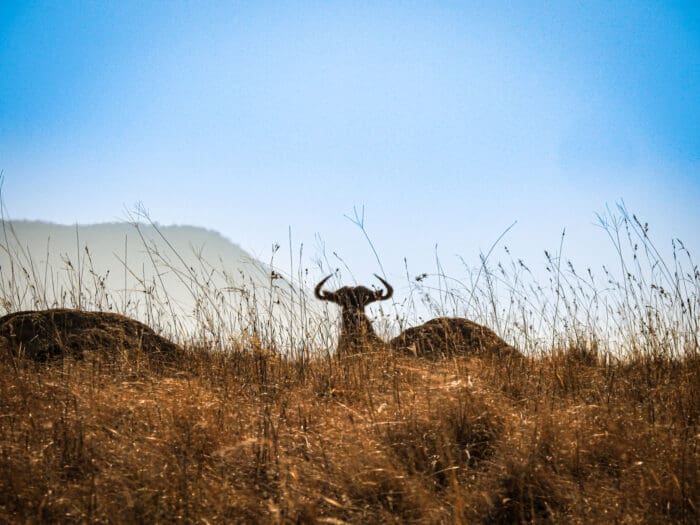
I have no idea where he came from, but he ran to join the herd and soon one running Blue Wildebeest became two, then a dozen, then a hundred game animals of all types sprinted away. Outpacing them all was the “greyhound of the plains,” our Black Wildebeest.
We gawked until they were out of sight, then walked back to the bakkie to try something new.
Driving to another part of the sprawling ranch, I listened to Jaques tell the story of his family and this land. While everyone around him told him it couldn’t be done, Jaques’ grandfather tamed these highland fields with an iron will and the same stubborn tenacity I’ve come to admire in his offspring.
There’s no quit in these people, but they do adapt. Where his grandfather fought like hell to get rid of the Black Wildebeest to save his crops, Jaques worked tirelessly to grow his herds and protect them from predators and poachers alike. And it was working.
Cresting a hill in the Land Cruiser, it looked like our luck was changing. Another mixed herd of the Black Wildebeest was already in sight, and almost within range. We stopped behind a thick batch of low-slung trees and carefully got out of the bakkie.
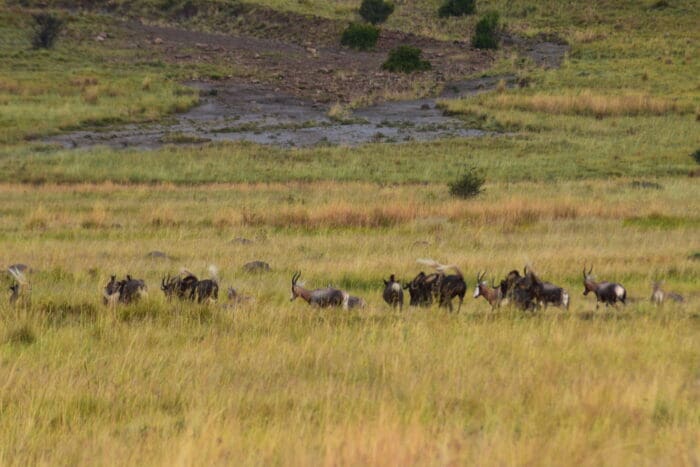
The herd spotted us, broke in a panic, and fled. But while the rest of the herd ran, a lone male stood to face me. I hurried forward to steady my rifle on a fallen limb.
Through the scope, I watched his nostrils flare. With his eyes wide, he dropped his head low, then slashed his forward curving horns up. A warning. One leg raised as he turned to run.
My trigger broke.
He dropped so quickly I thought I’d missed entirely. In reality, at just a hair over 200 yards, the bullet entered a little high, shattering the spine as it dips particularly low in the shoulder. He was done in a heartbeat.
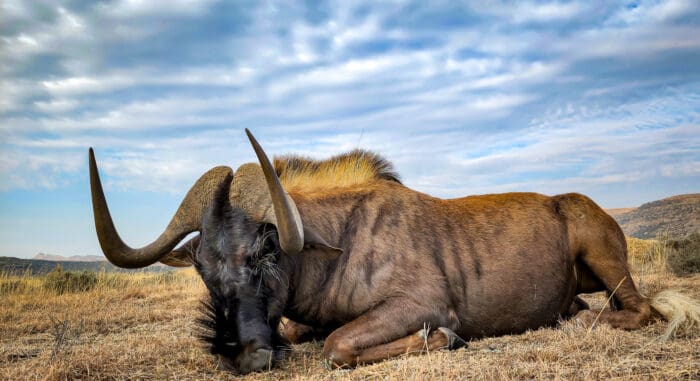
There’s no such thing as “ground shrinkage” with African game. Somehow, they’re all bigger up close. In the case of the Black Wildebeest, bigger and even more beautiful. His up-swept horns were polished ebony. His back mane was white and glittering gold, with a coat of copper, brown, and tan along with that taxonomic namesake white tail. The Black Wildebeest is awash with color.
We sat with him, marveling at him and all his colors and the Free State skies, right up until the African sun touched the mountains.
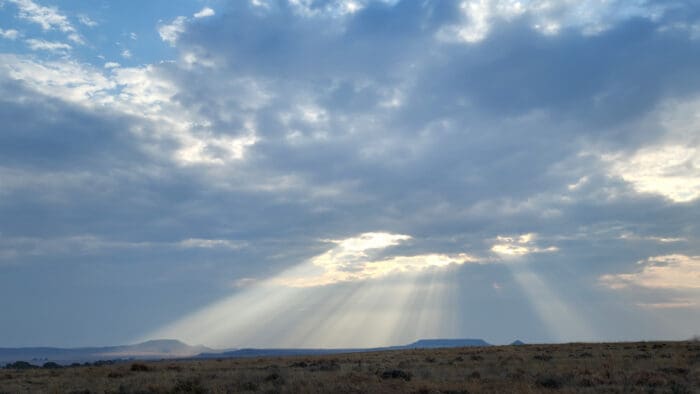
That night, sitting with three generations of Jaques’ family, Black Wildebeest was on the menu. Later, Jaques made biltong from the tougher parts of the animal using an old family recipe and provided a good portion of the remainder to a local old folks home. He’d take the money I very gladly paid him to keep the predator and poaching patrols going, fix the fences and everything else it takes to protect and grow the herds.
These mountain valleys still provide. Through solid conservation and good stewardship, these fields provided for a family, for a community, for one very happy hunter, and for the first time in generations, for the Black Wildebeest too.
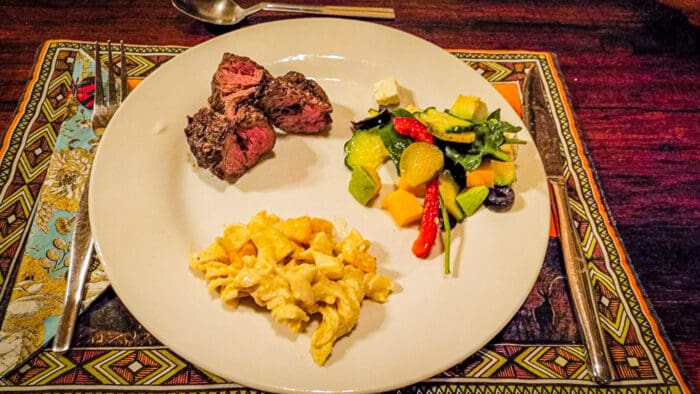
Jordaan Family Biltong Recipe
• Cut meat into strips after removing sinew and place in one layer in a tub.
• Sprinkle coarse salt, vinegar, pepper, Worcestershire sauce, crushed coriander.
• Repeat in layers.
• Leave to soak for at least 12 hours. Mix it all up well after 6 more hours and then leave in a cool, breezy place to air dry.
Jordaan Family Braai Sausage Recipe
• 3 1/2lbs meat
• 1lb sheep fat
• 1 level tablespoon salt
• 1 level teaspoon pepper
• 1/2 teaspoon cloves
• 1/2 teaspoon nutmeg
• 1/2 teaspoon ground ginger
• 1/2 teaspoon cumin
• 1/2 teaspoon allspice (pimento)
• 3 tablespoons crushed coriander
• 3 tablespoons vinegar
• Cut meat and fat into blocks
• Mix vinegar, meat, and spices together well
• Mince
• Use medium sized pig casings to stuff sausage

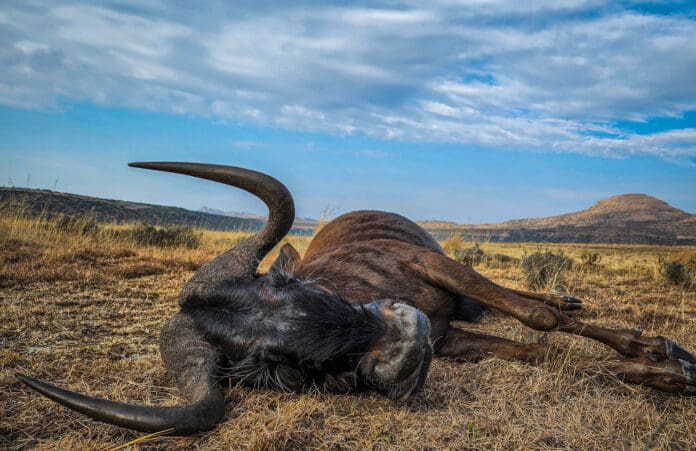



le fauve.
You went all the way to Africa to hunt black wild beast?
Chicago is closer.
Great educational read, something bigots 1 and 2 above couldn’t pen in a thousand years.
Our beloved Possum and tsbhoa.p.jr are bigots?
No surprise you said that, seeing you have been doing nothing but slandering and lying about what I said awhile back.
You claimed I won’t be voting for Trump in 2024, and I claimed didn’t vote for him in 2020.
PROVE I said that, or get down on your knees and beg for my forgiveness.
Post the link claiming I said I didn’t vote for Trump. Put up, or shut up. Someone who claims to hate slander and lies would expect no less… 🙂
Did you bother too read Possum’s comment, it was racist and bigoted. Reading comprehension is not a strong suit for you huh.
Fukk you
Them recipes made me hungry. The sides of the dumpsters are a little to hot right now. After the sun goes down theyll start cooling off.
On cooler days, your dinner is medium, maybe medium rare? On hot days, all you can get is well done, right?
Strange Taylor does not mention the caliber or type of bullet or scope or brand of gun he used. I wonder if he even went to Africa.
OMG. The biggest liar on this site, bar none, is wondering about some one else’s honesty? Be honest. The only reason you come here is because you have no social interaction at all. You’re alone and friendless and getting beaten up by us is the only attention you get. Right?
To Jethro the depraved stalker
When you point the finger at someone you have 3 fingers pointed right back at yourself.
I’ve only got one finger pointed at you, dacian the depraved fascist.
The middle finger.
If it wasn’t so pathetic, it’d be kinda funny, JWM.
In one hour and 15 minutes (12 midnight, July 1, 2023), the great state of Florida becomes a little bit freer, not requiring a ‘permission slip’ to exercise a fundamental human right.
Salute! 🙂
(sigh)
Californians become just a little jealous of Florida.
(Just a little…)
Ahh com on dacian.
You cant write a story like that unless you’ve been there.
There’s a full dozen articles and reviews with me in Africa on this website alone, plus other publications, plus instagram. I’ve spent at least 3 months every year on the continent for a few years in a row now, and this year will be no different.
And dacian is still in his mothers basement.
I’m glad that you made it out of South Africa alive… it’s not the safest place for a white male to be these days… hopefully they will have open Safari’s on the red beret marxist soon… if they do, please sign me up!
Nice article.
I imagine that black wildebeest is fantastic/delicious when cooked quickly on high heat to medium-rare.
As a long-time resident of Commorado, Florida is looking better and better…
Get rid of Denver and Boulder and we’d be just fime. Maybe take out the Springs just in case.
fime? 😁
What a glorious looking animal! What will become of the hide and horns?
I don’t know, but strongly suspect the extra meat goes to the locals…
From the article:
Later, Jaques made biltong from the tougher parts of the animal using an old family recipe and provided a good portion of the remainder to a local old folks home.
A record book blue wildebeest, this black wildebeest, and my last cape buffalo will all be Euro mounted on a pedestal together. All the hides are made into rugs throughout the house, a few stacked on top of each other.
Just wondering on a hunt like this how difficult it would be to bring a little bit of the meat home to the states? With regard to the hides made into rugs, so you have that done in Africa and the sent to the states? Thinking about doing this myself in a year or two after saving up.
It is apparently verboten, but I’ve brought back quite a bit of biltong from my animals in vacuum bags in my carry on bags.
Yes, I have the rugs made in SA and shipped with the rest of the trophies.
Comments are closed.